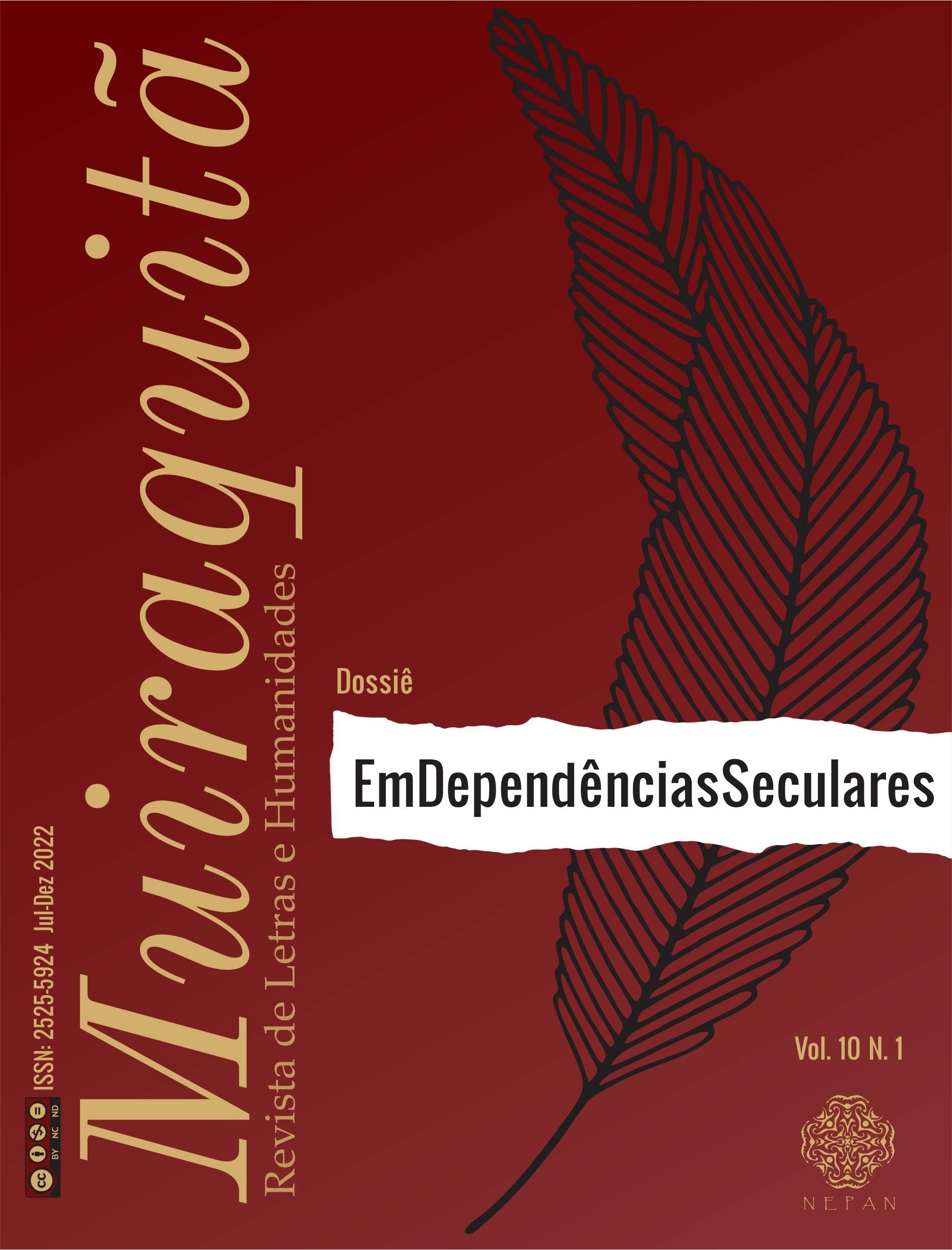Neologisms in the portuguese of Roraima
DOI:
https://doi.org/10.29327/210932.10.2-16Keywords:
Neologism, Lexicology, Portuguese from RoraimaAbstract
The present study identifies and characterizes neologisms in the Brazilian Portuguese spoken in the Northern state of Roraima. To this end, it discusses the concept of neologism (ALVES, 1996; GUILBERT, 1973) and its classification criteria (MATIELLO, 2017; JESUS, 2018; CARVALHO, 2009); its methodology is based on Hartmann and James (1998), and comprises the use of the introspection method, textual research (compilation of a corpus), the collection of informal conversations and comparison between collected data and general dictionaries and corpora. The results indicate that (1) some neologisms are typical (they seem to be used across the Northern region of Brazil),whereas others are specific to the state of Roraima; as the former were found to be prevalent, this confirms the relationship between Roraima Portuguese and other Northern varieties; (2) the neologism pattern is formal, which makes it possible to create new lexical units based on previous models (by analogy); (3) loan-type neologisms come from contact with indigenous peoples and with Venezuelans; (4) there are many Tupi-based neologisms, and they are already included in dictionaries; (5) loans from other indigenous languages are scarce, due to colonizing policies that sought to erase autochthonous cultures; (6) no Anglicisms from Guyana were found, despite the intense border exchange with the neighboring country; and (7) general Portuguese dictionaries present inconsistencies as to dating, initials and location of words linked to the Roraima context.
Downloads
References
ALVAR EZQUERRA, M. La formación de palabras en español. Madrid, España: Arco Libros, 1999.
ALVES, I. M. Neologismos. São Paulo: Ática: 1994.
ALVES, I. M. O conceito de neologia: da descrição lexical à planificação lingüística. Alfa, São Paulo, 40, p. 11-16, 1996. Disponível em: <https://periodicos.fclar.unesp.br/alfa/article/view/3992>. Acesso em: 05 abr. 2022.
BARBOSA, R. I. Expedições naturalistas e exploratórias na construção histórica do Vale do Rio Branco. Mens Agitat, v. 5, p. 157-164, 2010. Disponível em: <http://mensagitat.org/data/documents/V5-1-e-2-2010.pdf>. Acesso em: 05 abr. 2022
BARBOSA, R. I. Ocupação Humana em Roraima II. Uma revisão do equívoco da recente política de desenvolvimento e o crescimento desordenado. Boletim do Museu Paraense Emilio Goeldi., Belém, v. 9, n. 2, p. 177-197, 1993. Disponível em: <https://repositorio.museu-goeldi.br/handle/mgoeldi/467>. Acesso em: 05 abr. 2022.
BASILIO, M. M. P. O papel da metonímia na morfologia lexical. Revista Virtual de Estudos da Linguagem, v. 9, p. 99-117, 2011. Disponível em: <http://www.revel.inf.br/files/artigos/revel_esp_5_o_papel_da_metonimia_na_morfologia_lexical.pdf>. Acesso em: 05 abr. 2022.
CABRÉ, M. T. Terminology: Theory, Methods, and Applications. Amsterdam/Philadelphia: John Benjamins Publishing, 1999.
C MARA Jr., J. M. História e estrutura da língua portuguesa. Rio de Janeiro: Padrão, 1976.
CARVALHO, N. Empréstimos linguísticos na língua portuguesa. São Paulo: Cortez, 2009.
CORREIA, M. Neologia e Terminologia. In: MATEUS, M. H. M.; CORREIA, M. Terminologia: questões teóricas, métodos. Lisboa: Publicações Europa-América, 1998. Disponível em: <http://www.iltec.pt/pdf/wpapers/1998-mcorreia-neologia_terminologia.pdf> .Acesso em: 05 abr. 2022.
ESTORNELL, M. El reconocimiento de neologismos y su caracterización en un corpus de prensa escrita (2004-2007). Tese (Doutorado em Filologia Espanhola) - Universidade de Valência, Espanha, 2009. Disponível em: <https://www.tdx.cat/handle/10803/9827>. Acesso em: 05 abr. 2022.
GANANÇA, J. H. Neologia e neologismos no português brasileiro: principais ideias. Revista GTLex, v. 4, n. 1, p. 33–53, 2020. DOI: <https://doi.org/10.14393/Lex7-v4n1a2018-2.>
GUILBERT, L. Théorie du néologisme. Cahiers de l'Association internationale des études francaises, n. 25. p. 9-29, 1973. Disponível em: <https://www.persee.fr/doc/caief_0571-5865_1973_num_25_1_1020>. Acesso em: 05 abr. 2022.
HARTMANN, R. R. K.; JAMES, G. Manual of specialized lexicography. London/ New York: Routledge, 1998. DOI: <https://doi.org/10.4324/9780203017685>
JESUS, A. M. R. Tipologias dos neologismos: breve percurso histórico. GTLex, Uberlândia, vol. 4, n. 1, p. 54-67, 2018. DOI: <https://doi.org/10.14393/Lex7-v4n1a2018-3>
KOCH-GRÜNBERG, T. Vom Roroima zum Orinoco. Cambridge: University Press, 2009 [1916]. Vol. 2.
LUCIANO, G. S. O Índio Brasileiro. Brasília: MEC-SECAD/Museu Nacional-LACED, 2006.
MATIELLO, E. Analogy in word-formation. Berlin/Boston: De Gruyter Mouton, 2017. DOI : <https://doi.org/10.1515/9783110551419>
NIKLAS-SALMINEN, A. La lexicologie. 2 ed. Paris: Armand Colin, 2015 [1997].
ONU/CONARE/ACNUR. Refúgio em números. 4ª ed. Brasília: Ministério da Justiça, 2020. 46f. Disponível em: <https://www.acnur.org/portugues/wp-content/uploads/2019/07/Refugio-em-nu%CC%81meros_versa%CC%83o-23-de-julho-002.pdf>. Acesso em: 05 abr. 2022.
PIEL, J-M. Origens e estruturação histórica do léxico português. Estudos de Linguística Histórica Galego-Portuguesa, Lisboa: IN-CM, pp. 9-16, 1989 [1976]. Disponível em: <http://cvc.instituto-camoes.pt/hlp/biblioteca/origens_lex_port.pdf>. Acesso em: 05 abr. 2022.
ROSA, M. C. Introdução à morfologia. São Paulo: Contexto, 2009.
SABLAYROLLES, J-F.¿Neologismo o no? Ensayo de clarificación de algunos problemas de incorporación. Revista de Investigación Lingüística, Murcia, n. 12, p. 101-122, 2009. Disponível em: <https://revistas.um.es/ril/article/view/91271>. Acesso em: 05 abr. 2022.
VARO, C. Aproximación teórico-práctica al procesamiento lingüístico de neologismos léxicos. Revista Signos, v. 46, n. 81, p. 132-152, 2013. DOI: <http://dx.doi.org/10.4067/S0718-09342013000100006>

















